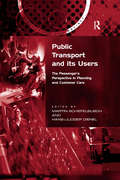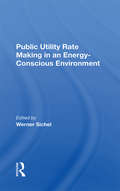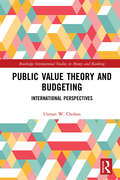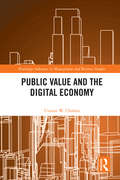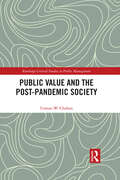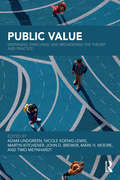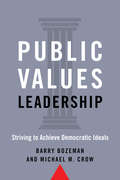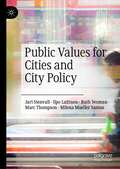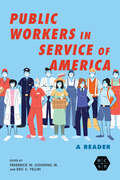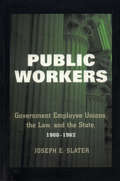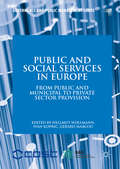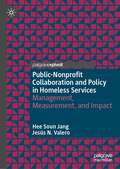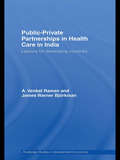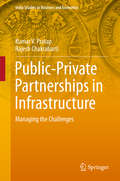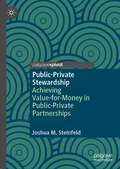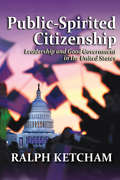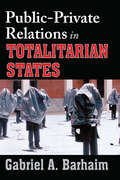- Table View
- List View
Public Transport and its Users: The Passenger's Perspective in Planning and Customer Care (Transport and Society)
by Hans-Liudger DienelPublic transport is essential to the quality of life of its passengers, both as a means to move around but also to achieve a sustainable environment. However, the passenger's position as a customer is weakened by the dominance of monopolies, regulation and political influence in our public transport systems. This book is one of the first to examine strategies for the representation of user interests in public transport from a variety of perspectives. The authors review approaches to integrating the passengers' views in the planning process and to protecting their interests in operations and customer care across a range of European countries, including Austria, Czech Republic, France, Germany, Italy, the Netherlands, Sweden, Switzerland, the UK and EU policies. The book presents the conclusions of this research and examples of good practice. In this respect it will provide useful guidance for policy makers, stakeholder organizations and planners, as well as transport researchers.
Public Universities, Managerialism and the Value of Higher Education (Palgrave Critical University Studies)
by Rob WattsThis book provides a rigorous examination into the realities of the current university system in Britain, America and Australia. The radical makeover of the higher education system which began in the 1980s has conventionally been understood as universities being transformed into businesses which sell education and research in a competitive market. This engaging and provocative book argues that this is not actually the case. Drawing on lived experience, Watts asserts that the reality is actually a consequence of contradictory government policy and new public management whose exponents talk and act ‘as-if’ universities have become businesses. The result of which is ‘market crazed governance’, whereby universities are subjected to expensive rebranding and advertising campaigns and the spread of a toxic culture of customer satisfaction surveys which ask students to evaluate their teachers and what they have learned, based on government ‘metrics’ of research ‘quality’.This has led to a situation where not only the normal teacher-student relationship is inverted, academic professional autonomy is eroded and many students are short-changed, but where universities are becoming places whose leaders are no longer prepared to tell the truth and too few academics are prepared to insist they do. An impassioned and methodical study, this book will be of great interest to academics and scholars in the field of higher education and education policy.
Public Utility Rate Making In An Energy-Conscious Environment
by Werner SichelThis collection of papers by some of America's most respected scholars and practitioners in the field of public utility regulation provides an up-to-date analysis of urgent problems and proposed remedies concerning the electricity and natural gas industries. The authors--two academic economists, a professor of law, a practicing attorney and consume
Public Value Management, Governance and Reform in Britain (International Series on Public Policy)
by John Connolly Arno van der ZwetThis book examines developments in governance reform in Britain, with a particular focus on the period since 2010. We argue that the experiences of the past decade mean that public value-based ideas are required to inform governance reform for the coming years. This needs to be prioritised due to the twin challenges of managing the aftermath of Brexit and navigating through the recovery phase of the COVID-19 pandemic. The volume outlines key themes, issues and debates relevant to contemporary public sector reform including: modes of state governance, evidence-based policy-making debates, the challenges and possibilities of public sector innovation, accountability issues, and the implications of Brexit. The overall conclusion of the book is that the coming decade presents an opportunity for more paradigmatic changes to UK governance but, for this to happen, political leaders need to prioritise a ‘reinventing government’ agenda underpinned by public value-based thinking and approaches. This book will be of particular interest to students of politics and public administration and relevant for those with general research interests in British governance and public policy.
Public Value Theory and Budgeting: International Perspectives (Routledge International Studies in Money and Banking)
by Usman W. ChohanPublic value theory has advanced over the past 30 years, but there is a need to extend its boundary outwards into new contexts and update its discourse to reflect new social challenges. We are now trying to create value in a globalized world, with supranational entities, with new international alliances and institutions, in a frightening post-truth era. How can public managers grapple with these emerging realities? This book seeks to provide answers to such public value questions by applying powerful budgeting perspectives. Using case studies of independent budget offices, key fiscal instruments, and leading public value frameworks, this book stands out in its use of budgetary lenses to answer pertinent questions about the multidimensional processes of value creation by and for a wider society. Pushing the debate on public value forward and taking it onto the global stage, the book asks whether public value (and other public administration theories) are applicable beyond the traditional context of the pro-globalization Western liberal democracies in which they were conceived. It does this by exploring the realms of developing countries, supranational entities, and post-Communist societies, among others. Finally, it presents these explorations in light of very recent sociopolitical trends and phenomena, including the growth of civil society, the global financial crisis, the illiberal democracy, and the post-truth era. Tailored to an audience comprising public administration scholars, students of government, budget practitioners, and social scientists interested in contemporary problems of values in society, this book helps to advance public administration thought by extending public value theory into new contexts and relating it to the growing global challenges of public life.
Public Value and the Digital Economy (Routledge Advances in Management and Business Studies)
by Usman W. ChohanHow can the public manager create and co-create value in the digital economy? While there is much exciting work being done, there is a pressing need to recontextualize public value theory (PVT), specifically in terms of its theoretical precepts, in the fluid and dynamic environment that the digital economy has produced. Much of the theoretical undergirding of PVT predates the full onset of today’s digital economy, leaving aside phenomena including citizen-driven innovations, decentralized digital structures, and the algorithmic foundations of new economic life. This is why a conceptually driven exercise in contemporizing PVT would be of great value to public administration’s theoreticians seeking to lead the theory in catching up to the praxis. This book seeks to answer the question of creating and co-creating public managerial value by presenting chapters that revisit categories central to the functions of public managers in relation to other value-creating agents under PVT. It introduces new and important lenses to PVT that are grounded in the praxis of the digital economy, raising new questions about old problems in PVT and generating newer formulations that push PVT forward and make its debates salient to the futures that lay before the modern public manager. The book therefore constitutes an important effort to take PVT forward by shedding new light on the potency of the public manager in confronting and constructing the digital economy through co-creation with the other agents of public value. It will be of interest to researchers, academics, and policy makers in the fields of public and nonprofit management, public administration and policy, and PVT.
Public Value and the Post-Pandemic Society (Routledge Critical Studies in Public Management)
by Usman W. ChohanThe destruction of the Covid-19 pandemic has marked every society with deep-seated wounds whose scars have only begun to heal. Yet, even as societies take their first steps away from the trauma of the pandemic, they confront new and perhaps equally daunting challenges in the post-Covid era. These challenges offer a unique occasion to consider how the mechanisms of public value (PV) creation and preservation can be rebuilt and improved, mindful of what has been left in the pandemic’s wake, and of the difficult road that lies ahead. The aim of this book, then, is to examine the forward-looking possibilities of multi-stakeholder value co-creation, which involves the renewed efforts of civil society, public managers, politicians, and society-at-large in a new post-pandemic era. The book examines many different facets that appeal deeply to public value scholarship: value stability & transitions, inequalities within & between publics, necropolitics, disaster preparedness, value measurement, and sustainability, all of which represent important explorations within public value theory, and can greatly enrich PV research going forward. This book will therefore be of use to both academics and practitioners of public administration and public policy, as well as scholars of government, health care policy, and economics.
Public Value: Deepening, Enriching, and Broadening the Theory and Practice
by Mark H. Moore John D. Brewer Timo Meynhardt Martin Kitchener Adam Lindgreen Nicole Koenig-LewisOver the last 10 years, the concept of value has emerged in both business and public life as part of an important process of measuring, benchmarking, and assuring the resources we invest and the outcomes we generate from our activities. In the context of public life, value is an important measure on the contribution to business and social good of activities for which strict financial measures are either inappropriate or fundamentally unsound. A systematic, interdisciplinary examination of public value is necessary to establish an essential definition and up-to-date picture of the field. In reflecting on the ‘public value project’, this book points to how the field has broadened well beyond its original focus on public sector management; has deepened in terms of the development of the analytical concepts and frameworks that linked the concepts together; and has been applied increasingly in concrete circumstances by academics, consultants, and practitioners. This book covers three main topics; deepening and enriching the theory of creating public value, broadening the theory and practice of creating public value to voluntary and commercial organisations and collaborative networks, and the challenge and opportunity that the concept of public value poses to social science and universities. Collectively, it offers new ways of looking at public and social assets against a backdrop of increasing financial pressure; new insights into changing social attitudes and perceptions of value; and new models for increasingly complicated collaborative forms of service delivery, involving public, private, and not-for-profit players.
Public Values Leadership: Striving to Achieve Democratic Ideals
by Barry Bozeman Michael M. CrowInstead of private gain or corporate profits, what if we set public values as the goal of leadership?Leadership means many things and takes many forms. But most studies of the topic give little attention to why people lead or to where they are leading us. In Public Values Leadership, Barry Bozeman and Michael M. Crow explore leadership that serves public values—that is to say, values that are focused on the collective good and fundamental rights rather than profit, organizational benefit, or personal gain. While nearly everyone agrees on core public values, there is less agreement on how to obtain them, especially during this era of increased social and political fragmentation. How does public values leadership differ from other types of organizational leadership, and what distinctive skills does it require? Drawing on their extensive experience as higher education leaders, Bozeman and Crow wrestle with the question of how to best attain universally agreed-upon public values like freedom, opportunity, health, and security. They present conversations and interviews with ten well-known leaders—people who have achieved public values objectives and who are willing to discuss their leadership styles in detail. They also offer a series of in-depth case studies of public values leadership and accomplishment. Public values leadership can only succeed if it includes a commitment to pragmatism, a deep skepticism about government versus market stereotypes, and a genuine belief in the fundamental importance of partnerships and alliances. Arguing for a "mutable leadership," they suggest that different people are leaders at different times and that ideas about natural leaders or all-purpose leaders are off the mark. Motivating readers, including students of public policy administration and practitioners in public and nonprofit organizations, to think systematically about their own values and how these can be translated into effective leadership, Public Values Leadership is highly personal and persuasive.
Public Values for Cities and City Policy
by Marc Thompson Ruth Yeoman Jari Stenvall Ilpo Laitinen Milena Mueller SantosThis book provides a framework for understanding the creation of public value in urban environments. The ability of cities to produce value is related to their capacity to generate meaningful resources for city residents and workers that enable them to craft meaningfulness in life and work. Meaningfulness and public value require new ways of leading and developing city governance. This extends to designing inclusive structures and processes for people to grapple with the meanings and values underpinning public value creation. A public value framework demands that city governance goes beyond ordinary government to considerations of how to involve city residents and workers in creating and maintaining the common good. The common good is determined by an inclusive associational life characterized by deliberative processes and opportunities for social contribution. When acting upon their entitlements to make the city, urban residents and workers – as members of diverse civic, public and private organizations – co-create the meanings that facilitate the collective action necessary to translate values into value. The experience of cooperating for the common good produces meanings that people can adopt into a sense that their lives have significance and purpose. This is particularly relevant to understanding how to motivate just and inclusive sustainability transitions, especially as cities recover from the Covid-19 pandemic. Focusing on cities and urban policy, the main theme of this book is to elaborate on public values for cities and city policies, and to further develop the concept of the meaningful city. This book aims to provide new kinds of tools for city development that can help them co-create resilience against future shocks.
Public Waters: Lessons from Wyoming for the American West
by Anne MacKinnonWyoming&’s colorful story of water management illuminates the powerful forces that impact water use in the rural American West. The state&’s rich history of managing this valuable natural resource provides insights and lessons for the twenty-first-century American West as it faces drought and climate change. Public Waters shows how, as popular hopes and dreams meet tough terrain, a central idea that has historically structured water management can guide water policy for Western states today.Drawing on forty years as a journalist with training in water law and economics, Anne MacKinnon paints a lively picture of the arcane twists in the notable record of water law in Wyoming. She maintains that other Western states should examine how local people control water and that states must draw on historical understandings of water as a public resource to find effective approaches to essential water issues in the West.
Public Workers in Service of America: A Reader (Working Class in American History)
by Eileen Boris Jon Shelton Katherine Turk Amy Zanoni William Powell Jones Cathleen D Cahill Joseph E Slater Francis RyanFrom white-collar executives to mail carriers, public workers meet the needs of the entire nation. Frederick W. Gooding Jr. and Eric S. Yellin edit a collection of new research on this understudied workforce. Part One begins in the late nineteenth- and early twentieth century to explore how questions of race, class, and gender shaped public workers, their workplaces, and their place in American democracy. In Part Two, essayists examine race and gender discrimination while revealing the subtle contemporary forms of marginalization that keep Black men and Black and white women underpaid and overlooked for promotion. The historic labor actions detailed in Part Three illuminate how city employees organized not only for better pay and working conditions but to seek recognition from city officials, the public, and the national labor movement. Part Four focuses on nurses and teachers to address the thorny question of whether certain groups deserve premium pay for their irreplaceable work and sacrifices or if serving the greater good is a reward unto itself. Contributors: Eileen Boris, Cathleen D. Cahill, Frederick W. Gooding Jr., William P. Jones, Francis Ryan, Jon Shelton, Joseph E. Slater, Katherine Turk, Eric S. Yellin, and Amy Zanoni
Public Workers: Government Employee Unions, the Law, and the State, 1900-1962
by Joseph E. SlaterFrom the dawn of the twentieth century to the early 1960s, public-sector unions generally had no legal right to strike, bargain, or arbitrate, and government workers could be fired simply for joining a union. Public Workers is the first book to analyze why public-sector labor law evolved as it did, separate from and much more restrictive than private-sector labor law, and what effect this law had on public-sector unions, organized labor as a whole, and by extension all of American politics. Joseph E. Slater shows how public-sector unions survived, represented their members, and set the stage for the most remarkable growth of worker organization in American history. Slater examines the battles of public-sector unions in the workplace, courts, and political arena, from the infamous Boston police strike of 1919, to teachers in Seattle fighting a yellow-dog rule, to the BSEIU in the 1930s representing public-sector janitors, to the fate of the powerful Transit Workers Union after New York City purchased the subways, to the long struggle by AFSCME that produced the nation's first public-sector labor law in Wisconsin in 1959. Slater introduces readers to a determined and often-ignored segment of the union movement and expands our knowledge of working men and women, the institutions they formed, and the organizational obstacles they faced.
Public and Private in Social Life (Routledge Revivals)
by S. I. Benn G. F. GausConceptions of publicness and privateness structure not only our thinking about society and ourselves, but also, by structuring our institutions and practices, dictate how we act within society. Originally published in 1983, the complexity inherent in the distinction between public and private is explored fully in this book.Opening chapters examine the familiar western liberal understanding of the public and the private; how it reflects not always coherent ideas about the relation of individuals to society, and how it structures legal, political, economic and moral practices and institutions.Attention is turned to Hegelian, Marxist and feminist critiques on the public and private dichotomy, and the study concludes with a comparative analysis of the public and the private in three non-western forms of society. In all, this study provides a fascinating insight into the ways different societies see themselves and into the concepts that shape society today.
Public and Private: Legal, Political and Philosophical Perspectives
by Maurizio Passerin D’Entrèves Ursula VogelThe public and private distinction is essential to our moral and political vocabularies as it continues to structure our social and legal practices. Public and Private provides a multidisciplinary perspective on this distinction which has been at the centre of controversial debate in recent years. The focus of the debate has been on delineating acceptable boundaries between public and private in economic, social and cultural spheres.What is the nature and scope of citizenship? What are the implications of new reproductive technologies? And what is the fate of state sovereignty in a globalised world economy? At first glance these questions may appear unrelated, yet they all raise underlying and serious concerns regarding the scope and proper boundaries between the public and the private.Public and Private will stimulate the current debate with its original approach and provide a valuable resource for all those interested in the role the public and private play in structuring our societies.
Public and Social Services in Europe
by Hellmut Wollmann Ivan Koprić Gérard MarcouThis book presents comparative analyses and accounts of the institutional changes that have occurred to the local level delivery of public utilities and personal social services in countries across Europe. Guided by a common conceptual frame and written by leading country experts, the book pursues a "developmental" approach to consider how the public/municipal sector-centred institutionalization of service delivery (climaxing in the 1970s) developed through its New Public Management-inspired and European Union market liberalization-driven restructuring of the 1980s and early 1990s. The book also discusses the most recent phase since the late 1990s, which has been marked by further marketization and privatization of service delivery on the one hand, and some return to public sector provision ("remunicipalization") on the other. By comprising some 20 European countries, including Central East European "transformation" countries as well as the "sovereign debt"-stricken countries of Southern Europe, the chapters of this volume cover a much broader cross section of countries than other recent publications on the same subject.
Public opinion polls and British politics (Routledge Revivals)
by Richard Hodder-WilliamsFirst published in 1970 Public opinion polls and British politics provides an introductory guide to political polling in Britain. The book describes the polling organizations themselves, their sampling methods, and some of the general problems encountered in survey work. A distinction is drawn between polls concerned with voting intentions (predictive polls) and polls concerned with the expression of opinion (opinion polls), and problems of interpretation in each are discussed. Public opinion polls are then considered in the context of British politics – firstly their relationship with the general principles of representative democracy, and secondly their effect on the practice of politics. Finally, a word of caution is sounded against taking the polls too seriously as accurate indicators of the thinking of the British electorate and also against treating the implications of their potential uses too lightly. This book is a must read for students of British politics, election studies and political science.
Public-Nonprofit Collaboration and Policy in Homeless Services: Management, Measurement, and Impact
by Hee Soun Jang Jesús N. ValeroThis book examines public-nonprofit collaborations in the context of federal homeless policy. Communities across the U.S. are expected to create local homeless service networks, known as Continuums of Care (CoCs), in order to respond to their incidence of homelessness. It leverages unique, original and national data and applies collaborative governance theories to develop a systematic understanding of network governance and leadership, health care services for those experiencing homelessness, and measuring impact of collaborative activities. The book offers a connected and comprehensive understanding of public-nonprofit collaboration in a homeless policy field and management strategies to lead and assess cross-sector arrangements.
Public-Private Partnership Projects in Infrastructure
by Jeffrey DelmonInvestment in infrastructure is critical to economic growth, quality of life, poverty reduction, access to education, healthcare, and achieving many of the goals of a robust economy. But infrastructure is difficult for the public sector to get right. Public-private partnerships (PPPs) can help; they provide more efficient procurement, focus on consumer satisfaction and life cycle maintenance, and provide new sources of investment, in particular through limited recourse debt. But PPPs present challenges of their own. This book provides a practical guide to PPPs for policy makers and strategists, showing how governments can enable and encourage PPPs, providing a step-by-step analysis of the development of PPP projects, and explaining how PPP financing works, what PPP contractual structures look like, and how PPP risk allocation works in practice. It includes specific discussion of each infrastructure sector, with a focus on the strategic and policy issues essential for successful development of infrastructure through PPPs.
Public-Private Partnerships in Health Care in India: Lessons for developing countries (Routledge Studies in Development Economics)
by A. Venkat Raman James Warner BjörkmanPublic-private partnerships are increasingly advocated to alleviate deficiencies in the public health system as well as to reduce economic stress on those who seek services from an expensive, burgeoning and unregulated private health sector. Focusing on India, this book examines how the private sector in developing countries is tapped to deliver health care services to poor and under-served sections of society through collaborative arrangements with the government. Having emerged as a key reform initiative, aspects of public-private partnership are examined such as the genesis of private sector partnerships, the ways in which the private sector is encouraged to deliver public health services, and the models and formats that make such partnerships possible. Based on in-depth case studies from different states of India and drawing on experiences in other countries, the authors analyse challenges, opportunities and benefits of implementing public-private partnerships and explore whether partnership with the private sector can be designed to deliver health care services to the poor as well as the consequences for beneficiaries. This book will be of interest to scholars of public policy and development administration, health policy and development economics as well as South Asian Studies.
Public-Private Partnerships in Infrastructure
by Kumar V. Pratap Rajesh ChakrabartiThe book provides readers with a clear understanding of infrastructure challenges, how Public-Private Partnerships (PPP) can help, and their use in practice. Infrastructure bottlenecks are generally considered the most important constraint to growth in many countries worldwide. Historically, infrastructure projects have been financed and implemented by the state. However, owing to the fiscal resource crunch, time and cost over-runs, and the general poor quality of publicly provided infrastructure, many emerging market governments, including India, have increasingly adopted PPPs with billions of dollars of investment riding on them. The results have been varied - from spectacular airports like the Delhi International Airport Limited with the associated controversy over land use, to the renegotiation of contracts as in the case of Tata Mundra Ultra Mega Power Project. Illustrating concepts with relevant case studies, the book makes the challenges of PPPs understandable to industry and management practitioners as well as students of management, public policy and economics. It is useful to practitioners wishing to avoid the pitfalls in the tricky terrain of PPPs and policymakers wanting guidance in crafting proper incentives. It also helps students gain a holistic and "applied" understanding of this increasingly important and popular model.
Public-Private Partnerships in the USA: Lessons to be Learned for the United Kingdom (Routledge Critical Studies in Public Management)
by Tony WallBroadly, a Public-Private Partnership (or PPP) is any collaboration between the public and private sector, but research in the UK has tended to focus on those that have been used for major infrastructure projects, such as roads, schools, and hospitals. This book compares and contrasts PPP research in the UK with that of cases in the USA, including interviews with some of the key stakeholders (decision makers in the public sector, contractors, and users) of PPPs in North America, and observations of PPPs in action (such as schools and roads). No prior major studies have compared the UK and USA when it comes to the development and operation of PPPs, and this book fills a gap in the literature, addressing a number of key questions, including: Is the private sector viewed with less suspicion in the USA when it comes to projects that would normally fall under the aegis of the public sector? How do politics affect PPPs? How do key players in the PPP process define project success, determine the merits and drawbacks of the initiative, and deal with controversial elements of the scheme such as value for money and risk transfer? The result is a volume that offers practical advice for the future development of PPPs in the UK.
Public-Private Stewardship: Achieving Value-for-Money in Public-Private Partnerships
by Joshua M. SteinfeldThis book offers a defense acquisition perspective that provides action orientations and decision making to increase the value-for-money (VFM) of public-private partnerships (PPPs) through public-private stewardship (PPS). The differing motives of the public and the private sector are not conducive to partnership that leads to optimal outcomes. PPS is offered to practitioners and academics as a solution to failures of PPPs by following the public stewardship tenets of fiduciary responsibility and advancing the public interest while factoring in the additional elements of the private sector. The public values of transparency, accountability, responsibility, responsiveness, efficiency, effectiveness, equity, diversity, inclusion, fairness, and security, among others, can be shared in success between the public and private partners. By establishing shared values aligning with each stakeholder’s measures for success, it is possible to devise value propositions for stakeholder decision making that supports inter-organizational strategy, operations, tactics, goals, and objectives. PPS practices can further ensue as the public-private steward utilizes tools of expertise and organizational capacity. The book provides seven portraits of practitioners in the practice of PPS to assist PPP stakeholders achieve VFM. PPS is illustrated using examples in the Department of Navy (DON) and Department of Defense (DOD).
Public-Spirited Citizenship: Leadership and Good Government in the United States
by Ralph KetchamAny searching look at the theory and practice of citizenship in the United States today is bewildering and disconcerting. Despite earnest concern for participation, access, and "leverage," there is a widespread perception that nothing citizens do has much meaning or influence. This book argues that for American democracy to work in the twenty-first century, renewed interest in teaching the nation's young citizens a sense of the public good is imperative.All of the nation's founders, especially Adams, Jefferson, Franklin, and Madison, addressed the question of whether and how a citizen can make a difference in the American political process. This concern harkens back even farther, to Locke, Erasmus, and Aristotle. Today, one obstacle to good citizenship is the social scientific turn in political science. Leaders in civic education in the twentieth century eschewed grand ideas and moral principles in favour of a focus on behaviourism and competitive, liberal politics. Another problem is the growing belief that the government has no business promoting the public good through the support of religious, educational, or cultural efforts.Ralph Ketcham vividly depicts the relationship of private self-interest and public-spirited action as these pertain to citizenship and good government. This is an enlightening book for the general reader, as well as for students, professional social scientists, and political philosophers.
Public-private Relations in Totalitarian States
by Gabriel BarhaimThis book argues that the transition by Western society to late modernity has weakened the social order, creating a quasi-anomic state that favors those conditions that place culture in a position of prominence. The preponderance of culture over social, with its affinity for profane and its immanent nature, is posited by the author to have a major impact on the fabric of social life and its implications especially on social solidarity. Gabriel A. Barhaim employs a number of ideas and concepts to illuminate the central theme of a feeble social order. Such concepts are, among others, crisis of reference, desacralization of the social order, the predominance of individual networks as a new form of social solidarity, overpowering of the public sphere, and the reduction in authority of collective representations. The persistent crisis of the social order-strongly visible in the disappearance of major ideologies on the one hand, and in the disintegration of the state and its institutions on the other hand-has been the impetus to cultural phenomena whose prevailing themes encode the fate of individuals, both symbolically and expressively. Barhaim regards the social order as the inspiring scene of action, while culture, with its diverse modes of expressions, provides guiding commentaries. In grappling with these topics in each chapter, the analysis reveals the many facets of culture and the many symbolic forms it takes. All of this provides the necessary commentaries needed to make sense of a bewildered social life, in the context of late modernity. These commentaries should be viewed mostly as a path to understanding the pressing social arrangements, interactions, practices, of contemporary life. Three out of the eight chapters are concerned with the East-Central European experience.
